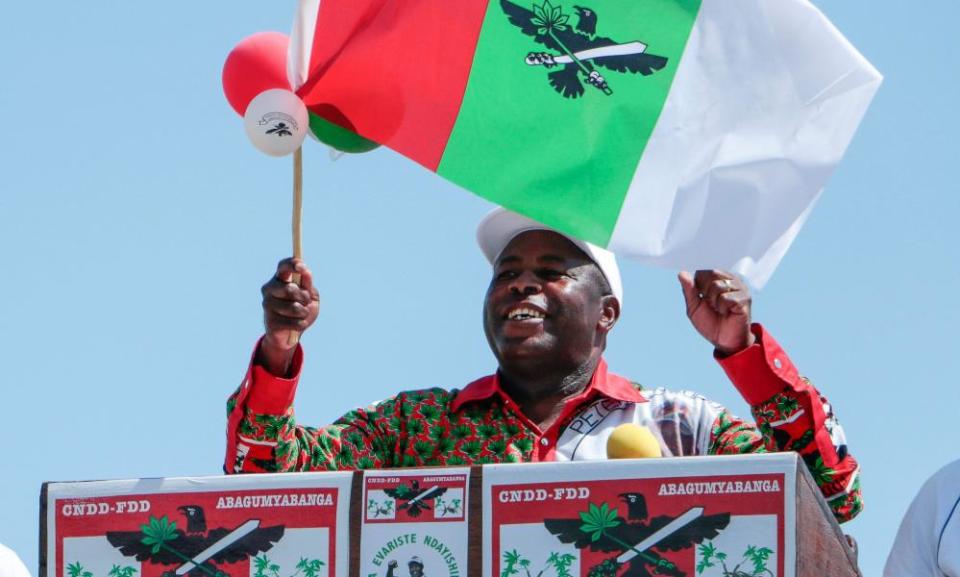Burundi to go to polls amid fears authorities playing down Covid-19

Millions of voters in Burundi will go to the polls on Wednesday to elect a new president in the first competitive election since a decade-long civil war began in 1993.
Amid concern that authorities are deliberately playing down the threat posed by the coronavirus pandemic, seven candidates are seeking to replace the incumbent Pierre Nkurunziza, who is being forced to step down by opponents within the country’s ruling CNDD-FDD party.
Rights groups say the government is pressing ahead with the vote irresponsibly, and accuse the CNDD-FDD and its youth wing of crushing dissent and threatening those taking their own measures against coronavirus.
Last week Burundi expelled the World Health Organization’s expert team working on coronavirus. Campaigning politicians have held rallies attended by tens of thousands.
The nation of 11 million people has reported 27 cases of Covid-19 so far but has only carried out about 520 tests in total. Officials have cited divine protection for Burundi’s ostensibly low infection rate and urged citizens to go about their daily lives without fear.
Nkurunziza’s spokesperson recently said that though the country may be hit by the pandemic, “Burundi … has signed a special covenant with God, whether you believe it or not”.
Evariste Ndayishimiye, the CNDD-FDD’s candidate, said people should not be afraid because “God loves Burundi”, adding that if there were people who had tested positive, it was “so that God may manifest his power in Burundi”.
Six other candidates are running, including the opposition leader Agathon Rwasa, who is deputy chairman of the national assembly. Rwasa has been able to open offices and hold large rallies around the country in what has been an unexpectedly competitive campaign.
Nelleke van de Walle of the International Crisis Group, a research organisation, said: “You do see certain elements of a real election … but political space is really limited. There is almost no local or international media left. This is definitely not an election where people can express their opinions freely.”
Both Ndayishimiye and Rwasa were senior commanders in predominantly Hutu militias during a civil war in which about 300,000 people were killed. Nkurunziza came to power in 2005 as part of a peace deal.
Ndayishimiye has promised to “fight poverty and develop the country”, claiming his party had taken 15 years to “lay the foundations” for the future, and it was not the time to put “amateurs” in power.
Voters who spoke to journalists in Burundi last week were too fearful to give their names. A 45-year-old vegetable seller in the capital, Bujumbura, supported the ruling party because it had provided welfare.
“They give us rice and beans and can build houses for the most vulnerable among us like elders or widows,” she said.
But a jobless 32-year-old supported the opposition. “All of us need change, many Burundians need … one to end this daily violence, these killings, this rampant corruption and economic embezzlement,” he said.
Medics and others have braved official threats to raise concerns that the true number of Covid-19 cases is much higher than the official count.
A health ministry official, speaking on condition of anonymity, said seven patients had gone to one hospital with symptoms such as respiratory distress and that a whole wing had been dedicated to them ata military hospital.
A doctor, who also spoke on condition of anonymity, reported six deaths of patients “presenting all the symptoms of coronavirus” last week.
Six staff responsible for taking samples at the National Institute of Public Health, the only place in Burundi that was carrying out tests, have become ill with the virus.
“Since then all activity is paralysed, no test can be carried out, it is a catastrophe,” an employee of the institute said.
The country’s last election in 2015 led to violence that left at least 1,200 dead, displaced hundreds of thousands and resulted in a sustained crackdown on the opposition and media. Aid was cut off by donors and sanctions imposed.
Last year the government shut down the UN human rights office after repeated criticism that members of the CNDD-FDD’s youth wing and the security services were torturing, gang-raping and murdering political opponents. Rights groups say those attacks have increased in the run-up to Wednesday’s presidential, legislative and municipal elections.
Nkurunziza will remain president until August, and a new constitution has given him sweeping powers to declare a state of emergency if the results are disputed.
“A perfect storm is brewing in Burundi, but after years of repression, few are left to bear witness and sound the alarm,” said Lewis Mudge, Central Africa director at Human Rights Watch.
Burundi is one the poorest country in the world, by some measures.
“The economic record of Nkurunziza’s 15 years in power is catastrophic. He has taken Burundi backward on all levels, he has completely isolated the country from its traditional donors and even neighbouring countries. It is a calamity,” said Aime Magera, an exiled spokesman for the main opposition National Freedom Council.

 Yahoo Sports
Yahoo Sports 